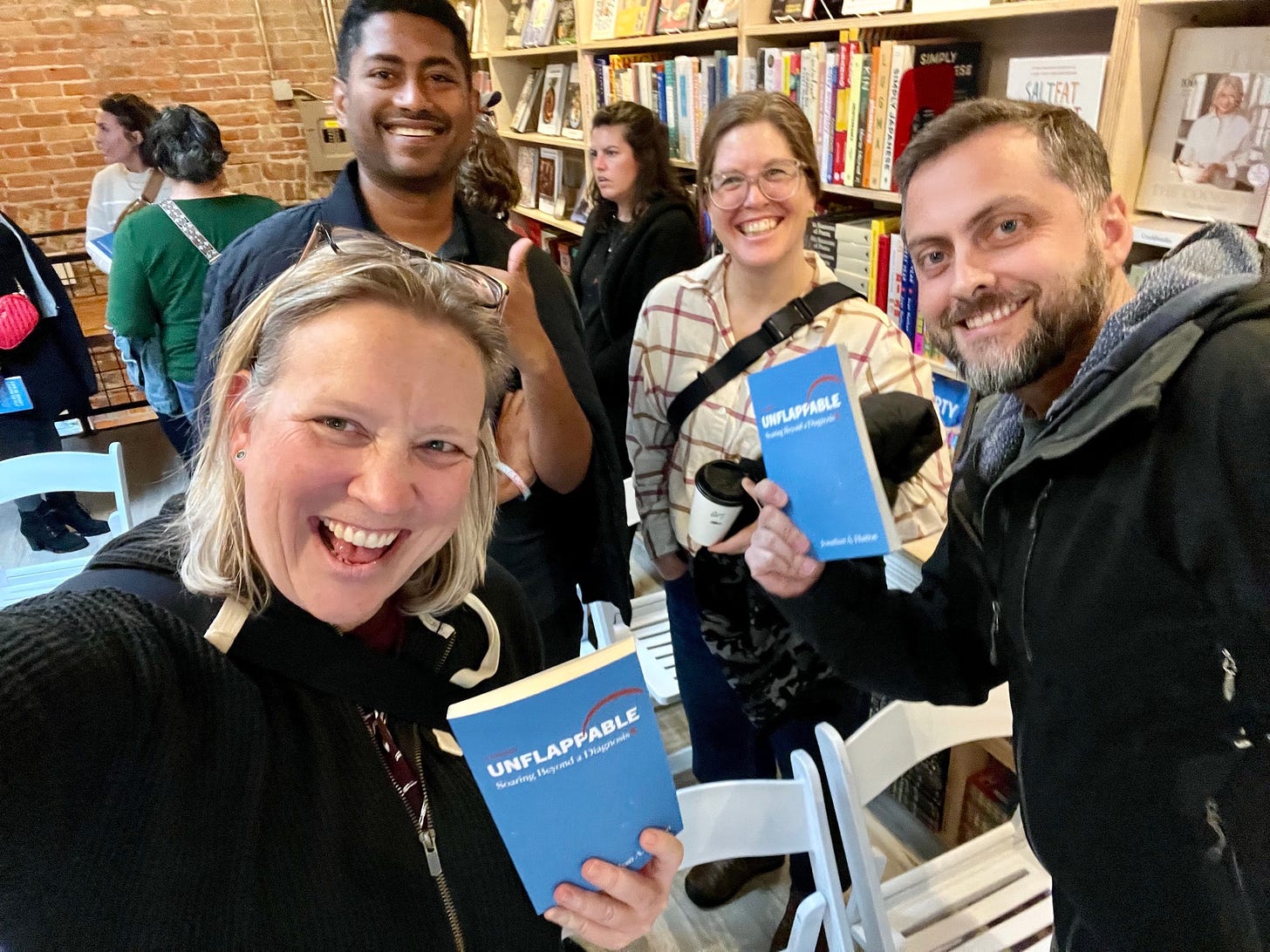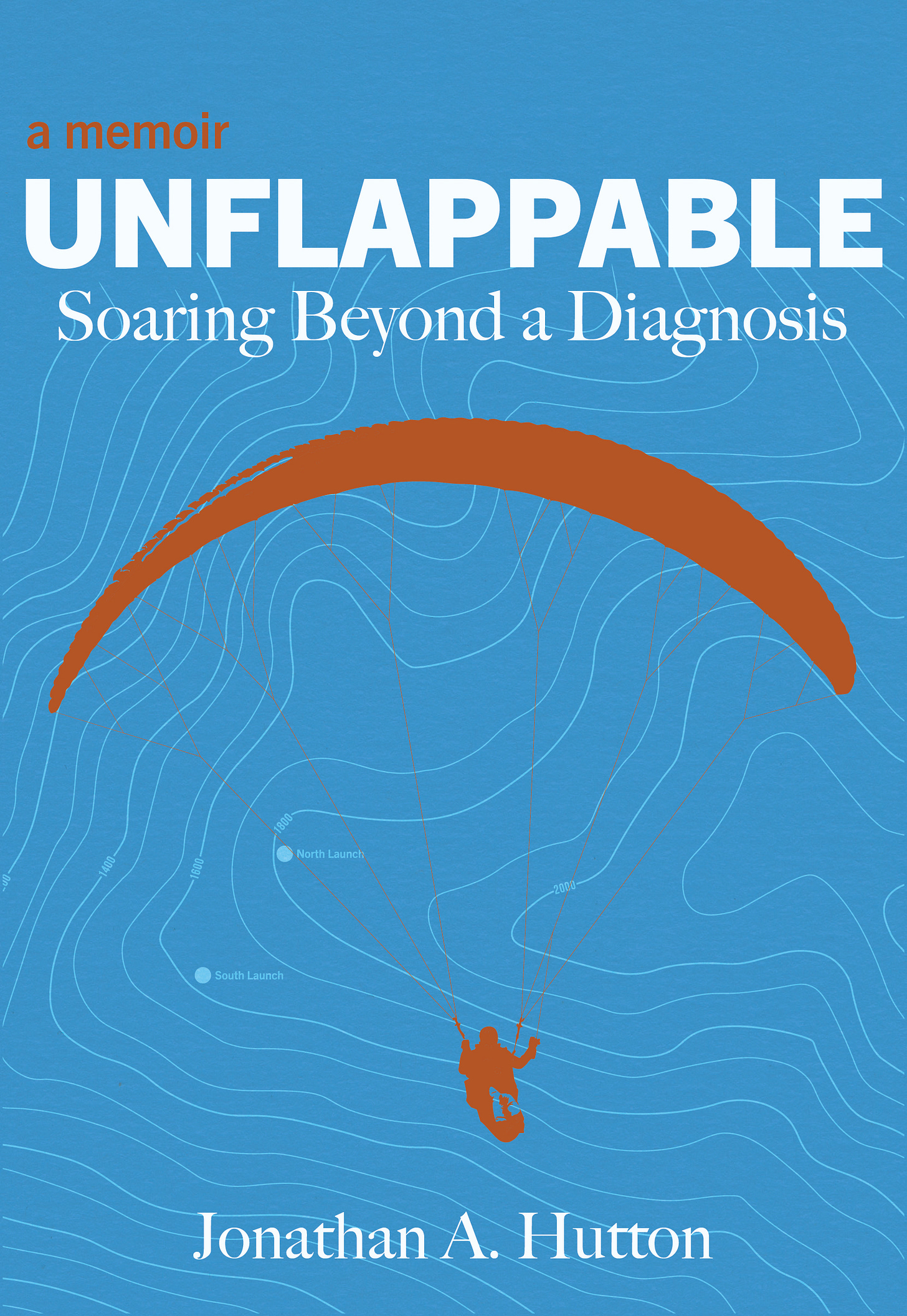Experiments in attention
Advertising and promoting a self-published memoir

I’ve been thinking about attention—the act of focusing it (on a place, an activity, a person, a sensation) and the methods we use to seize hold of someone else’s (a letter, an email, a text, a post, an advertisement). Reading a book requires dedicated attention, but further upstream, you need to be aware that it exists, and you’ll probably need a nudge: Hey, look—a paragliding and cancer memoir, very unique. You should buy it. I knew I’d need to run some experiments on capturing the attention of friends and family, people who know of me, along with the broader swaths of memoir readers, cancer survivors, medical practitioners, and the rest. Some of these experiments have been great fun, others have left me feeling uneasy and conflicted, reminded that attention is thoroughly monetized in most areas of modern life, including reading.
Book events: real life attention and story time
Thus far, we’ve held three readings and I can say definitively that in-person events are my favorite way of engaging with readers. Each one has been unique—different venues, different people, different passages chosen to read. I loved planning the events, setting up the sound, and standing in front of an audience with a microphone. I had to remind myself a few times that the purpose was to read from and promote my book, not to crack wise and tell meandering stories1.
At a reading, my full attention is on the page in front of me and the audience is actively listening, participating by reacting—laughing, smiling, nodding, wincing. Seeing reactions to words I’ve written in real-time was deeply gratifying, and I’ve enjoyed answering questions about the book, the work that went into writing it, my perspective now on what I’ve produced. Perhaps I will do more book events in the future; I sure hope so.
In-person book events
Effort: 💪 💪 💪
Investment: $ $
Fun factor: ❤️ ❤️ ❤️ ❤️ ❤️
Podcasts: low stakes interview practice
Did you know there is a platform for finding podcasts hosts and guests? It’s called PodMatch and thus far my experience has been… mostly positive, if a bit odd. I’ve sat for 5 interviews and the hosts have all been welcoming; some asked thought-provoking questions and expressed real interest in my story, and others seemed to be reading from an AI generated script.
When I am being interviewed, I have some idea of the questions I’ll be asked and the scope of the discussion, but I’m often surprised, which, like the Q&A following a reading, is a thrill. I pay attention to what I am asked and how I respond, aware that a listener does not know me, careful to provide background and context. What’s going on for that person, the listener, is anyone’s guess. Maybe they are driving or scrolling, working at their desk or sitting on the couch; they could be paying attention or wholly disengaged.
[And yes, I will be sharing links to these interviews, once they are available]
Podcast interviews
Effort: 💪
Investment: $
Fun factor: ❤️ ❤️ ❤️ ❤️
Email marketing: I wrote a book, will you review it?
Gokul reached out via LinkedIn and the offer was straightforward: an email campaign that would target book bloggers and reviewers, in an effort to build awareness organically (meaning without the use of ads). His guarantee was that 40% of the people on his list (350 or so) would open the email (footnote on email open rates). We worked together to refine a template that would be used and soon I started receiving responses back.
I spend enough time in the land of email that I can easily detect any whiff of AI—there was some, along with formulaic, copy and paste auto-responses. Some contained the brevity of a real, human-composed email note: Sure, I’d love to review your book. Please send me a copy.
Another theme that began to emerge: simply providing a free copy of my book was not be enough. I would need to pay a fee, anywhere from $25-500, to have a reviewed featured on their site or social media account. I’d paid Gokul to garner the attention of these reviewers and now I would need to pay them for the opportunity to potentially have the attention of their audiences.
A couple of reviewers did agree to read my book and post a write up with no sales pitch, but these were outliers. Two or three of the people who responded were in a different category altogether: book influencers, people with vast online followings, mostly on Instagram. I am planning to run another experiment with one of them, despite the fact that paying for this sort of attention feels craven and desperate. Perhaps I will feel differently if the experiment provides tangible results.
Book reviewer outreach
Effort: 💪
Investment: $ $
Fun factor: ❤️ ❤️
Amazon ads: gambling for clicks
I came across an essay recently that captured my gut reaction as I tried to learn the Amazon ads platform: this is just… gambling. I’m not sure if Olivia Crandall coined the phrase Pocket Casino, but it’s apt and that’s precisely how our phones—and the apps and platforms that surround them—are engineered.
I chose to distribute my book via IngramSpark (footnote: the way you get your book into stores after you convince a bookstore owner to carry it) and KDP, which is Amazon’s self-publishing arm. Amazon is inescapable. They own the ebook market and a large slice of the print market. Many (perhaps most) authors who self-publish do so entirely within Amazon’s ecosystem. Oh, and they are happy to sell you the chance to put your title in front of potential readers. I decided to proceed with this loathsome experiment.
I am, in effect, paying Amazon to distribute the book, while also competing with other authors (and publishers) for eyeballs and clicks, placing bids (aka bets) in a game where the house wins no matter what2. What’s more, this system of keywords and categories is so arcane and complicated, so opaque, that you need experience playing it before you can somewhat reliably turn keywords into clicks, and clicks into sales in an economical fashion. The time required was a bridge too far for me, so I hired an expert to run the experiments. I have no idea what the outcome will be, but figured I’d roll the dice and see what happens.
I am deeply conflicted about all of this but aware that my options for promoting this book are constrained by my name recognition (non-existent), platform and reach (very limited), and budget (minimal). I would like someone to offer me a compelling counterargument that what I’ve described here is not gambling.
Keyword roulette
Effort: 💪 💪
Investment: $ $ $
Fun factor: 💔
At a certain point in the not-too-distant future, I won’t be putting much effort into promoting this book. Writing and publishing it was a grand experiment and it may find its way to a larger audience, but odds are a year from now I will still have unsold copies sitting on a shelf. My expectations were measured early on and they are still, but the idea of winning big, of making a successful bet that triggers a cascade of interest is intoxicating.
We are now living in the age of video clips, where fewer people read books; the act of sitting and reading requires sustained attention, and there are fewer and fewer incentives to cultivate it. I try to remain hopeful—perhaps the ability to produce a book-length work, something profoundly human, will become even more useful in the age of AI. Or maybe it will become obsolete. Either way, I’ll be here, paying attention.
📣 Advertisement time ⬇️
Unflappable: Soaring Beyond a Diagnosis is out now. You can purchase a signed copy directly from me, or find it at Amazon or Bookshop.org.
I can imagine a reality where I have 10-15 minutes of book/paragliding/cancer adjacent stand up material…
Speaking of podcasts, I highly recommend listening to this episode, which is all about why platforms become shittier over time.



